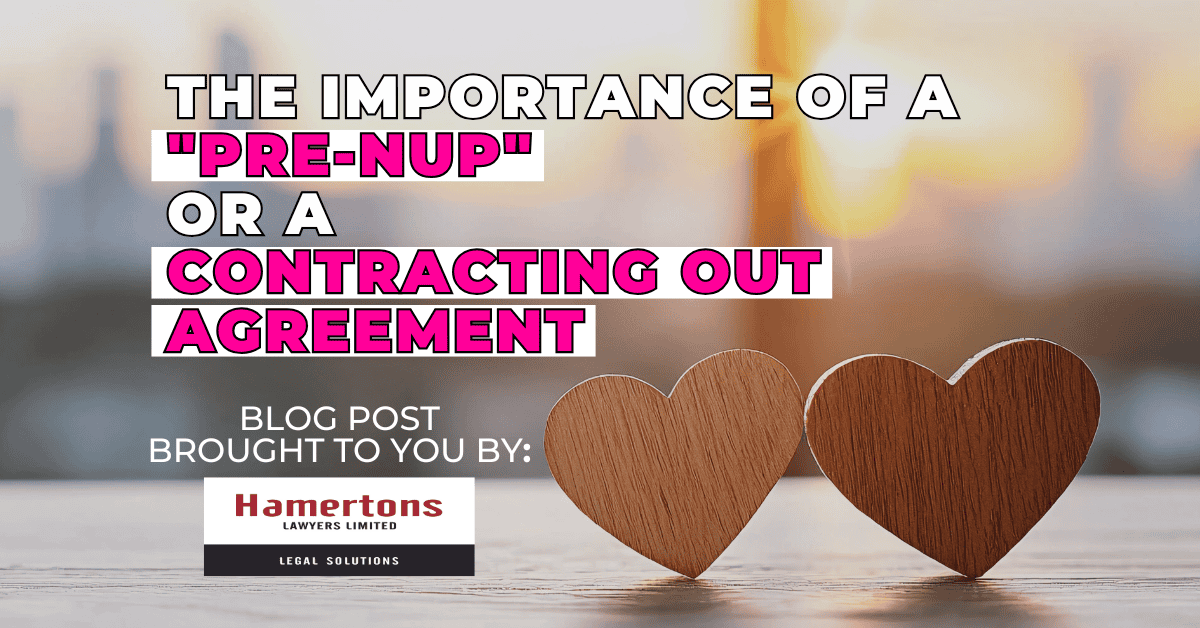News

The Importance of a “Pre-Nup” or a Contracting Out Agreement
This blog post is brought to you by:

The Property (Relationships) Act 1976 (“the Act”) states that when a couple have been in a relationship for 3 years or more, their assets and liabilities are to be divided equally between them if they were to separate. A Contracting Out Agreement or, in American terms, a “Pre-Nup”, is an effective way to keep certain property separate from ‘Relationship Property’ when there is a qualifying relationship.
Even though we think our relationship will last forever, the reality is that sometimes relationships come to an end. If that happens, it’s important to ensure that there is a clear understanding about what will happen to the property (assets or liabilities such as debt) that each person owns. A Contracting Out Agreement “contracts out” of the Act and directs what is to happen with specific assets and liabilities belonging to the parties in the event of separation. The key is to implement a Contracting Out Agreement when things are going well with a view that, provided things stay that way, the Agreement will most likely never be brought up again.
Even though a Contracting Out Agreement defines how certain assets or liabilities are to be allocated in the event of the relationship breaking down, separation or death, each party to the relationship can also make further provisions in their Will.
Why make a Contracting Out Agreement and when is one helpful?
If you own a house when you meet your partner and you both end up moving into it together, it is likely to be defined by the Act as the “Family Home”. Under the Act, a Family Home is joint property. In light of this, you would want to protect your house as your separate property. This is achievable by implementing a Contracting Out Agreement to ensure that if you and your partner were to ever separate, you would be entitled to keep your house (and any other specified assets) as your separate property.
Another example is an inheritance. While generally speaking inheritance is separate property, if you were to use part of your inheritance to buy a house with your partner, you would want to make sure your whole inheritance always remains your separate property. This can be done with a Contracting Out Agreement.
If you own the best motorhome in town or the sparkliest prized jewels and want make sure these things remain yours – we recommend that you consider a Contracting Out Agreement.
What happens if we separate, how does it all work?
If the Act applies to your relationship, the general rule is that relationship property (the assets and liabilities from a relationship) will be equally divided between you and your partner. Separate Property will not be divided and will remain with the person who owns it. A Contracting Out Agreement specifically identifies separate property and, because a Contracting Out Agreement is a legal document, it removes any ambiguity about who owns what. At an already stressful time, this can be a lifesaver.
If you were to separate, we recommend that you see a lawyer for legal advice in the first instance. Let the lawyer know that there is a Contracting Out Agreement, so that they can obtain a copy of it. Any assets or liabilities that are not mentioned in the Contracting Out Agreement, are likely to be ‘Relationship Property’ and subject to equal division.
What if there is a Trust?
A Trust is a separate legal entity, which means any assets or liabilities held in the Trust are not owned by you or your partner. Generally speaking, the Act does not apply to Trust owned property. An exception to this is if you and your partner establish a Trust during the relationship and you transfer property into it, that property may be open to a claim for division under the Act.
So, I want a contracting out agreement, but where do I start?
Discussions about Contracting Out Agreements are not always the easiest to have, particularly when you begin a new relationship, or when your existing relationship is approaching the 3-year mark. It is important, however, to establish a mutual understanding when it comes to protecting or sharing your relationship property. This will almost definitely bring clarity and peace of mind in the unfortunate event that things don’t turn out quite as planned.
The next step is to talk to us. There is no “one size fits all” agreement. Everyone’s situation is different and personal to them. The first step is meeting with you to discuss your situation, and we will provide you with advice specific to your circumstances.
From there, we will create an Agreement that fits your circumstances. While this may seem like a daunting process, we are here to help!
Reach out to one of our team, who would be more than happy to guide you through your options.
Be sure to check out Hamertons Lawyers Ltd past webinar, ‘Relationship Property 101’. To watch, click HERE.















